
A professional phone answering service acts as an extension of your business by handling incoming calls during business hours, after hours, or even 24/7 depending on your needs. Here’s a breakdown of what they offer:
- Live Receptionists: Professional, courteous staff answer your calls in a friendly and informative manner, projecting a positive image for your business.
- Message Taking: They can take detailed messages, including the caller’s name, number, and the reason for their call. This ensures you don’t miss any potential leads or important customer inquiries.
- Call Screening and Transferring: Services can screen calls based on your instructions, prioritize urgent calls, and even transfer calls directly to the appropriate department or staff member within your organization.
- Appointment Scheduling: Some services can even schedule appointments for you, streamlining your workflow and improving customer service.
- Customization: Many providers allow you to customize greetings, hold messages, and even message delivery methods (email, text message, etc.) to suit your specific needs.
Benefits of Using a Professional Phone Answering Service
- Improved Customer Service: Ensures you never miss a call, allowing you to respond to inquiries promptly and enhance customer satisfaction.
- Increased Productivity: Frees you and your staff from answering routine calls, allowing you to focus on core business activities.
- Enhanced Professional Image: Projects a polished and professional image to callers, even outside of regular business hours.
- 24/7 Availability: Provides coverage beyond your set working hours, ensuring you don’t lose potential leads or miss important messages.
- Scalability: Easily scales up or down based on your business needs, offering flexibility as your company grows.
Things to Consider When Choosing a Service
- Pricing: Costs vary depending on the features offered, message volume, and call duration.
- Features: Consider features like 24/7 availability, message delivery options, and appointment scheduling to find a service that meets your specific needs.
- Contract Length: Some services offer month-to-month contracts, while others require longer commitments. Choose a term that aligns with your business needs.
- Customer Reviews: Read online reviews and testimonials to get a sense of the quality of service offered by different providers.
Here are some resources to help you find a professional phone answering service:
- Forbes Advisor: https://www.forbes.com/advisor/business/software/best-answering-services/ This website provides reviews of popular answering services, including pricing and feature comparisons.
- Google Search: Conduct a web search using terms like “professional phone answering service” or “virtual receptionist service” to find providers in your area.
what is Professional Phone Answering Service!

A professional phone answering service is a business service that handles incoming calls on behalf of other businesses. It provides live operators to answer calls, take messages, schedule appointments, and perform various other call-related tasks according to the specific needs of the client business.
Here’s a breakdown of what a professional phone answering service typically offers:
Live Call Answering
Instead of automated systems or voicemail, professional answering services provide live operators who answer calls promptly with a customized greeting tailored to the client’s business.
Message Taking
Operators take messages from callers, recording important information such as the caller’s name, contact details, reason for calling, and any specific requests or details provided by the caller.
Call Screening and Routing
Calls can be screened and routed based on predefined instructions provided by the client. Urgent calls may be forwarded immediately to designated personnel, while routine inquiries are handled according to specific protocols.
Appointment Scheduling
Many professional answering services offer appointment scheduling capabilities. Operators can access the client’s calendar or scheduling system to book appointments on behalf of callers.
After-Hours Support
Answering services can handle calls outside of regular business hours, ensuring that callers always reach a live representative even when the client’s business is closed.
Overflow Call Handling
During periods of high call volume or when internal staff are unavailable, answering services can handle overflow calls to prevent callers from experiencing long wait times or being directed to voicemail.
Customized Scripts
Clients can provide customized scripts or guidelines to ensure that operators represent their brand accurately and consistently. This includes information about the business, FAQs, and specific instructions for handling various types of calls.
Bilingual Support
Many answering services offer bilingual support to cater to clients with diverse customer bases. Operators may be fluent in multiple languages to assist callers effectively.
Emergency Response
Answering services can follow predefined protocols to handle emergency situations, escalate calls as necessary, and notify appropriate personnel within the client’s organization.
Call Reporting and Analytics
Clients typically have access to call reports and analytics that provide insights into call volumes, response times, call outcomes, and other metrics. This information can help businesses optimize their call handling processes and improve customer service.
Overall, a professional phone answering service helps businesses enhance their customer service capabilities, improve efficiency, and ensure that callers receive professional and personalized assistance at all times, leading to higher customer satisfaction and retention.
The Importance of Professional Phone Answering Service in Business Development.

Let’s delve deeper into the benefits of a professional phone answering service with step-by-step details:
By leveraging the services of a professional phone answering service, businesses can enjoy a wide range of benefits, including prompt response times, efficient call management, enhanced customer satisfaction, brand consistency, and data-driven insights for continuous improvement. These benefits collectively contribute to business development, market expansion, and long-term success in today’s competitive landscape.
1: Prompt Response
- Immediate Assistance: Live operators ensure callers receive prompt responses, reducing wait times and enhancing customer satisfaction.
- First Impression: Quick and courteous handling of calls creates a positive first impression, setting the tone for future interactions.
2: Overflow Handling
- Seamless Management: During peak periods, the service efficiently manages excess call volume, preventing overwhelmed internal staff and missed opportunities.
- Scalability: Businesses can scale their call handling capacity as needed without the hassle of hiring additional personnel.
3: After-Hours Support
- Round-the-Clock Availability: Customers can reach the business at any time, regardless of business hours, improving accessibility and accommodating varying schedules.
- Global Reach: Businesses can cater to customers in different time zones or regions, facilitating international expansion and market reach.
4: Appointment Scheduling
- Streamlined Process: The service handles appointment booking and management, reducing administrative burden and ensuring accuracy.
- Enhanced Customer Experience: Convenient scheduling options improve customer satisfaction and encourage repeat business.
5: Customized Scripts
- Brand Consistency: Tailored scripts reflect the brand’s tone and values, reinforcing brand identity and professionalism.
- Accurate Information: Operators provide consistent and accurate information to callers, reducing confusion and ensuring clarity.
6: Emergency Handling
- Preparedness: Predefined protocols for emergencies ensure swift and appropriate responses, minimizing downtime and mitigating potential crises.
- Customer Trust: Efficient handling of emergencies builds trust and confidence in the business’s ability to address unforeseen situations.
7: Bilingual Support
- Inclusivity: Multilingual operators accommodate diverse customer bases, fostering inclusivity and accessibility.
- Market Penetration: Language proficiency facilitates expansion into new markets and demographics, increasing customer acquisition opportunities.
8: Call Reporting
- Data Insights: Detailed analytics provide valuable insights into call trends, customer preferences, and service performance.
- Continuous Improvement: Businesses can use data-driven insights to optimize call handling processes, refine customer service strategies, and drive business growth.
Conclusion
By leveraging the services of a professional phone answering service, businesses can enjoy a wide range of benefits, including prompt response times, efficient call management, enhanced customer satisfaction, brand consistency, and data-driven insights for continuous improvement. These benefits collectively contribute to business development, market expansion, and long-term success in today’s competitive landscape.
What is the SOP’s of Professional Phone Answering Service

Standard Operating Procedures (SOPs) for a professional phone answering service outline the guidelines and protocols that operators follow to ensure consistent, efficient, and high-quality call handling. Here’s an overview of the typical SOPs for such a service:
Greeting Protocol
- Operators are trained to greet callers with a standardized greeting that includes the name of the business and a courteous welcome message.
- SOPs specify the tone, language, and demeanor to maintain professionalism and positive customer interactions.
Call Handling Procedures
- SOPs outline the steps to handle various types of calls, including inquiries, messages, appointments, emergencies, and escalations.
- Operators follow predefined scripts or guidelines for consistency and accuracy in information delivery.
Message Taking
- SOPs detail the information to collect from callers, including their name, contact details, reason for calling, and any specific requests or details.
- Operators are trained to record messages accurately and legibly, ensuring all pertinent information is captured.
Call Screening and Routing
- SOPs specify criteria for call screening and routing based on urgency, caller identity, or nature of the inquiry.
- Operators follow protocols to route calls to appropriate departments or personnel, ensuring timely resolution.
Appointment Scheduling
- SOPs provide guidelines for scheduling appointments, including accessing the client’s calendar, confirming availability, and booking appointments accurately.
- Operators follow protocols for managing scheduling conflicts, cancellations, and rescheduling requests.
Emergency Response
- SOPs outline procedures for handling emergency calls, including assessing the situation, gathering necessary information, and escalating to appropriate personnel or authorities.
- Operators follow predefined protocols to ensure swift and effective responses in emergency situations.
Quality Assurance
- SOPs include mechanisms for quality assurance, such as call monitoring, feedback, and coaching sessions.
- Supervisors or quality assurance teams review calls regularly to ensure adherence to SOPs and identify areas for improvement.
Data Security and Confidentiality
- SOPs emphasize the importance of data security and confidentiality when handling sensitive information.
- Operators are trained to follow strict protocols for data protection, including secure storage, transmission, and disposal of information.
Continuous Training and Development
- SOPs include provisions for ongoing training and development of operators to maintain proficiency in call handling skills and keep abreast of industry trends and best practices.
- Regular training sessions and refresher courses ensure operators remain competent and capable of delivering high-quality service.
Compliance and Legal Requirements
- SOPs ensure compliance with relevant regulations, laws, and industry standards governing call handling, data privacy, and consumer protection.
- Operators are trained to adhere to legal requirements and ethical guidelines when interacting with callers and handling sensitive information.
By following these SOPs, professional phone answering services can maintain consistency, efficiency, and excellence in call handling, leading to improved customer satisfaction and business success.
Why Professional Phone Answering Service is required for the business.
professional phone answering service is essential for businesses for several reasons:
- Enhanced Customer Experience:Prompt and courteous call handling ensures that customers receive immediate assistance, leading to positive interactions and improved satisfaction.
- 24/7 Availability: Professional answering services offer round-the-clock support, ensuring that customers can reach the business at any time, even outside regular business hours.
- Overflow Call Management: During peak periods or when internal staff are unavailable, answering services manage excess call volume, preventing missed opportunities and long wait times.
- Improved Efficiency: Outsourcing call handling to professionals frees up internal resources, allowing businesses to focus on core activities and strategic priorities.
- Brand Representation: Trained operators represent the business professionally, maintaining brand consistency and leaving a positive impression on callers.
- Appointment Scheduling: Answering services can handle appointment scheduling, streamlining processes and enhancing customer convenience.
- Cost-Effective Solution: Professional phone answering services offer cost-effective solutions compared to hiring full-time receptionists or expanding internal call center operations.
- Scalability: Businesses can scale their call handling capacity as needed without the hassle of hiring and training additional staff, adapting to fluctuating call volumes seamlessly.
- Emergency Response: Answering services follow predefined protocols for handling emergencies, ensuring swift and appropriate responses and maintaining customer trust.
- Data Insights: Detailed call analytics provide valuable insights into customer preferences, call trends, and service performance, enabling businesses to make informed decisions and optimize operations.
In summary, a professional phone answering service is crucial for businesses to provide exceptional customer service, maintain accessibility, improve efficiency, and optimize resources, ultimately contributing to business growth and success.
Requirement for Professional Phone Answering Service complete inhouse setup
Setting up a professional phone answering service in-house requires careful planning and investment in various resources. Here’s a comprehensive list of requirements for establishing an in-house professional phone answering service:
Physical Space
Allocate a dedicated area within the office premises for the call center operation. Ensure it is equipped with desks, chairs, and workstations for operators.
Communication Infrastructure
- Telephone Systems: Install a business phone system capable of handling multiple incoming calls simultaneously. Options include PBX (Private Branch Exchange) systems or VoIP (Voice over Internet Protocol) solutions.
- Headsets: Provide comfortable and high-quality headsets for operators to facilitate clear communication with callers.
- Telephone Lines: Set up sufficient telephone lines to accommodate incoming calls and avoid busy signals.
Technology and Software
- Call Management Software: Invest in call management software that provides features such as call routing, call queuing, call recording, and reporting.
- CRM (Customer Relationship Management) Software: Implement CRM software to manage customer information, call histories, and interactions effectively.
- Appointment Scheduling Software: Use scheduling software to manage appointments efficiently and synchronize with operators’ schedules.
- Data Security Tools: Implement security measures to protect sensitive customer information, including firewalls, encryption, and access controls.
Staffing and Training
- Call Operators: Hire skilled and customer-focused call operators capable of handling various types of calls professionally.
- Training Programs: Develop comprehensive training programs to educate operators on call handling procedures, customer service techniques, product knowledge, and using call management software.
- Supervisors: Assign experienced supervisors to oversee call center operations, provide guidance to operators, and ensure adherence to quality standards.
Standard Operating Procedures (SOPs)
- Develop SOPs outlining call handling procedures, greeting scripts, escalation protocols, and quality assurance measures.
- Regularly review and update SOPs to reflect changes in business processes, customer needs, and industry best practices.
Quality Assurance Measures
- Call Monitoring: Implement systems for monitoring and evaluating calls to assess operator performance, identify areas for improvement, and maintain service quality.
- Feedback Mechanisms: Establish channels for providing feedback to operators, including coaching sessions, performance reviews, and recognition programs.
- Performance Metrics: Define key performance indicators (KPIs) such as call abandonment rate, average handling time, and customer satisfaction scores to measure call center performance.
Compliance and Legal Considerations
- Familiarize with regulatory requirements governing call center operations, including consumer privacy laws, telemarketing regulations, and data protection laws.
- Ensure compliance with industry standards and certifications relevant to call center operations.
Backup and Redundancy
- Implement backup systems and redundancy measures to ensure continuity of operations in case of system failures, power outages, or other emergencies.
- Maintain backup power sources such as generators or uninterruptible power supplies (UPS) to keep critical systems operational.
Integration with Other Departments
- Collaborate with other departments such as customer support, sales, and marketing to ensure seamless coordination and information sharing.
- Integrate call center systems with existing business systems and processes to streamline operations and enhance efficiency.
Continuous Improvement
- Establish a culture of continuous improvement by soliciting feedback from customers and stakeholders, analyzing performance data, and implementing initiatives to enhance service quality and efficiency.
- Regularly review and update systems, processes, and training programs to adapt to changing business needs and customer expectations.
By fulfilling these requirements, businesses can establish an effective in-house professional phone answering service capable of delivering exceptional customer experiences and supporting business growth.
Top 10 Professional Phone Answering Service Provider Companies.
here’s a bit more detail about each of the top 10 professional phone answering service providers:
Octopus Digital Network
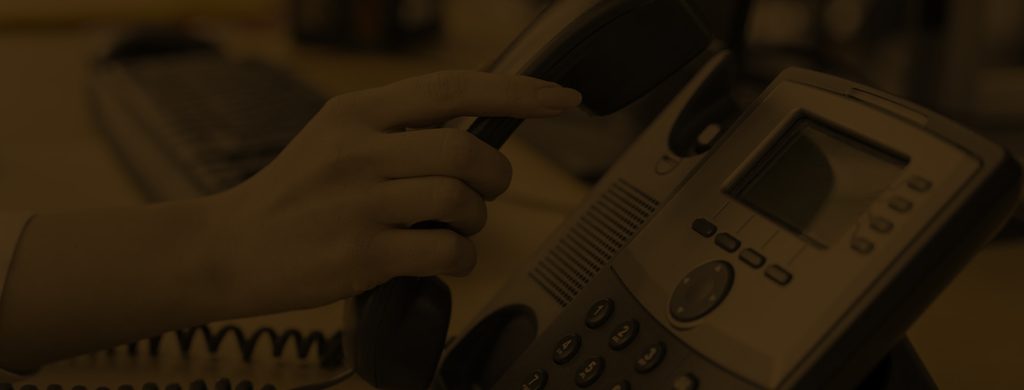
Known for its advanced technology solutions, OCTOPUS DIGITAL NETWROK offers comprehensive call answering services, including virtual receptionists, appointment scheduling, and multilingual support. Their services are tailored to businesses of all sizes and industries.
Ruby Receptionists
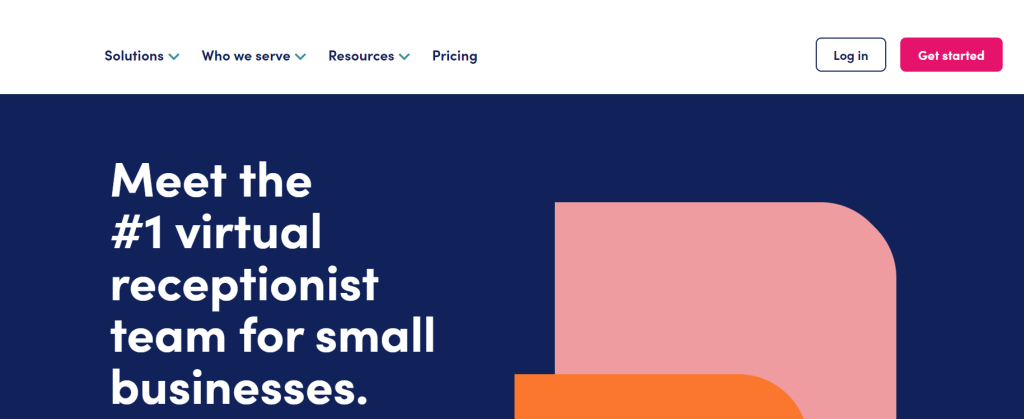
Ruby Receptionists focuses on delivering personalized, human-powered call answering solutions. They pride themselves on creating great first impressions for callers and providing exceptional customer experiences through their live receptionist services.
AnswerConnect
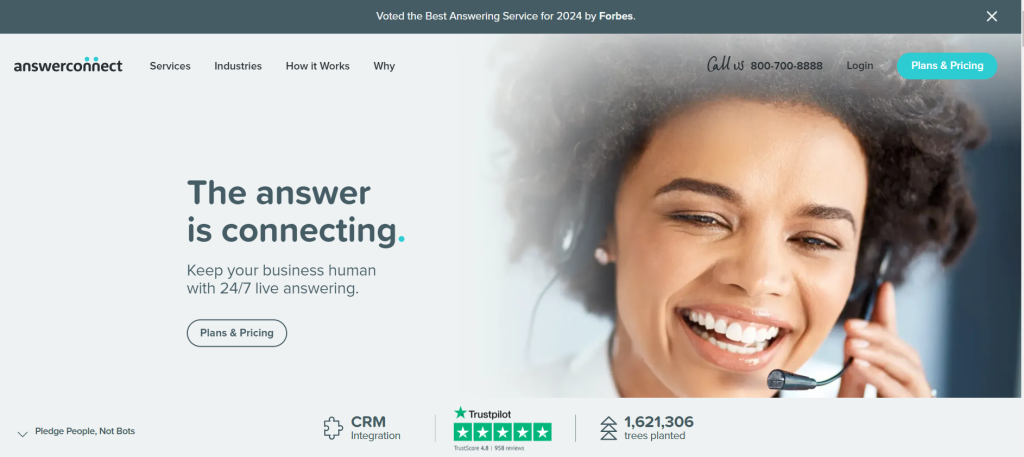
AnswerConnect provides 24/7 live answering services, virtual receptionists, and customer support solutions. With a global presence, they offer multilingual support and customizable call handling options to meet the needs of businesses worldwide.
Moneypenny

Moneypenny offers virtual receptionist services, call answering solutions, and live chat support. Their team of receptionists provides professional call handling and message taking services to help businesses maintain a positive image and improve customer satisfaction.
Smith.ai

Smith.ai specializes in providing virtual receptionist and live chat services to small and medium-sized businesses. They focus on lead qualification, appointment scheduling, and providing excellent customer service to help businesses capture and convert leads effectively.
PATLive
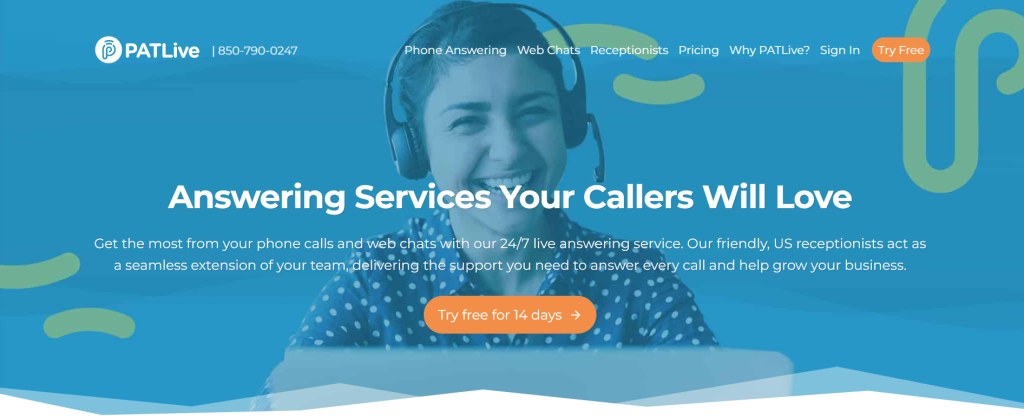
PATLive offers customizable call answering solutions, including live receptionists, message taking, and appointment scheduling services. Their team of professional receptionists ensures that calls are handled promptly and professionally, providing a seamless experience for callers.
VoiceNation
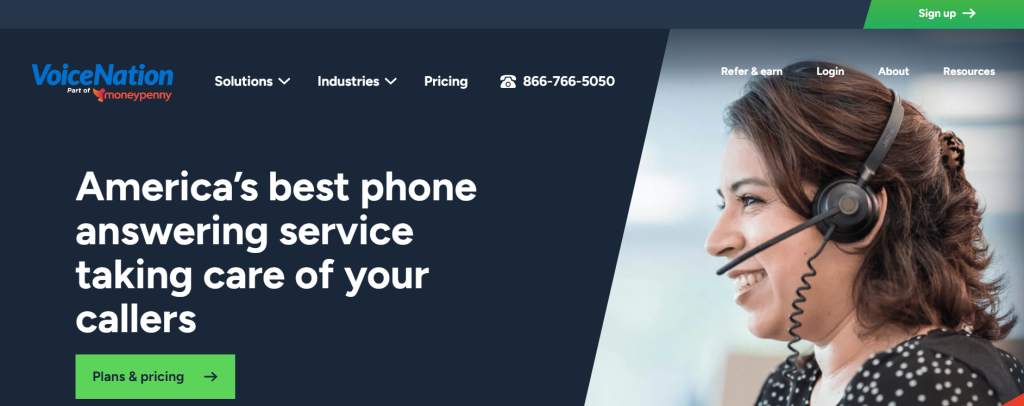
VoiceNation provides live answering services, call overflow support, and customizable solutions tailored to businesses’ unique needs. They offer a range of call handling options, including message taking, call forwarding, and order processing services.
MAP Communications
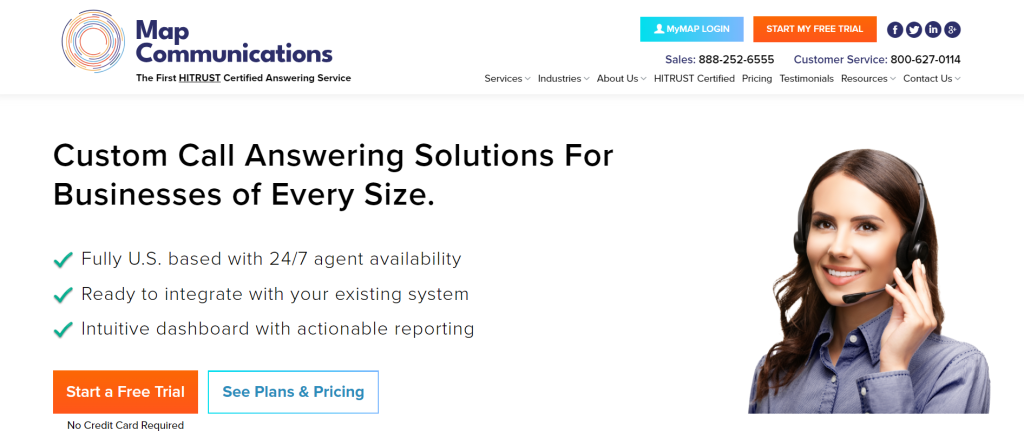
MAP Communications offers professional call answering and call center solutions, including virtual receptionists, customer support, and order processing services. Their customizable solutions help businesses streamline communication and improve customer satisfaction.
Specialty Answering Service
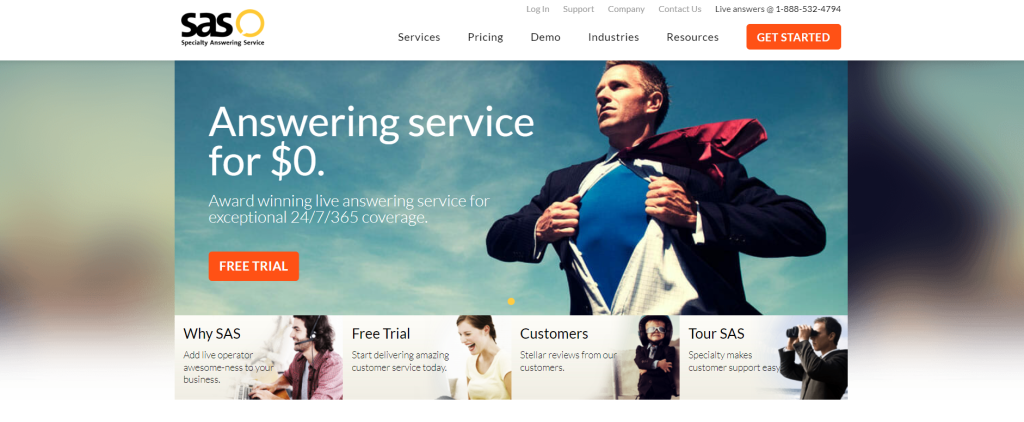
Specialty Answering Service provides customized call answering solutions for businesses, including live receptionists, order processing, and appointment scheduling services. They focus on delivering excellent customer service and helping businesses manage their call volume effectively.
These providers stand out for their professionalism, reliability, and commitment to delivering high-quality phone answering services tailored to businesses’ specific needs and preferences.
